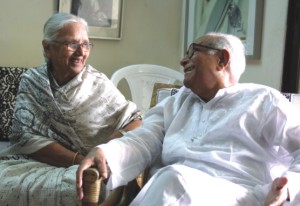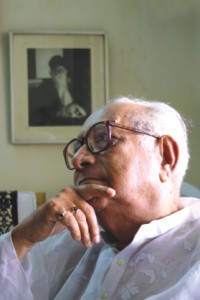|
Tribute
Death of a Legend
AAntaki Raisa
 |
Photo: Zahedul i khan |
Kalim Sharafi was born on May 8, 1924 in the village of Birbhum in West Bengal, India and his forefathers belonged to a family of pirs who prohibited practising music and it's ironic that this very family gave the nation one of the greatest Rabindra Sangeet exponents of all time. It was Sharafi's love for music that led him to defy his family's wishes and secretly patronise it as he grew up. He would listen to famous artists and musicians of the then pre-independent India and learn from them. In an interview with star magazine he mentioned “I was always a quick learner. As a child I used to find Rabindranath's compositions naturally melodic and heart touching and would grasp them easily.” He wished to study in Shanti Niketan, but due to his leftist leanings he never got admitted. He went to Dakkhini in Kolkata to learn Rabindra Sangeet. Due to its conventional style of teaching, Sharafi later joined Shamnbhu Mitra's Indian Peoples Theatre (IPTA). It was during this period he got acquainted with Hemanta Mukharjee, Saleel Chowdhury, Suchitra Mitra and Shubho Guhothakurta. He considered Shubho his guru and the most influencing person in his development as an artiste.
“Before Sharafi there was only one style of Tagore songs- Shanti Niketan style. Sharafi brought about a new style of singing which could be compared as a Renaissance of Rabindra Sangeet, ” says noted economist and Tagore singer Professor Anisur Rahman about Sharafi's singular contribution to Rabindra Sangeet.
Sharafi's charisma was not limited within the boundary of music. He resorted to music to liberate the oppressed of the then undivided India from the British Raj. “Sharafi wanted to free the Indian subcontinent from the British Monarchy. He wanted to establish the values of communism, he wanted to emancipate those who were enslaved in the society and that is why he joined the Quit India Movement in the 40s,” says Mujahidul Islam Selim who has worked with Kalim Sharafi for the Communist Party.
“He was arrested under the Defense of India Act for this reason and put into jail,” he adds.
Sharafi had been against communalism all his life. He was one of the very few Muslim activists to join the Quit India Movement. During 1946, when communal riot was at its peak, Sharafi worked for Hindu-Muslim fraternity; his goal was to end the divide and rule policy of the British Raj by vanquishing communal differences. Sharafi even had an alias- Kalyan Mitra- to take part in programmes that used to be held in Hindu-dominant territories.
“After the Partition, Kalim Sharafi moved to Chittagang from Kolkata. Then, during the early 50s he came to Dhaka,” says Anisur Rahman. “In the late 50s Rabindra Sangeet was banned by the Pakistani Government. Kalim bhai formed a group ho-jo-bo-ro-lo with us where we used to sing Tagore Songs and other patriotic songs inside closed doors,” he adds.
 “Some leaders do not require pompous speech to motivate the mass, some don't need any rally to make their point, Sharafi was one such leader. He influenced through his music. Cultural Movement during the Pakistani Period was his greatest contribution. He was our comrade,” Selim says.It is because of him and people like him that Tagore's literature is still an inseparable part of our culture. “Some leaders do not require pompous speech to motivate the mass, some don't need any rally to make their point, Sharafi was one such leader. He influenced through his music. Cultural Movement during the Pakistani Period was his greatest contribution. He was our comrade,” Selim says.It is because of him and people like him that Tagore's literature is still an inseparable part of our culture.
Despite all hindrances, Sharafi became the founder director of Bangladesh Television in 1964. He made an album with Sanjida Khatun, Fahmida Khatun, Afsari Khanam and Rakhee Chakrabarti. He performed as a playback singer in the first-ever Bengali film “Mukh O Mukhosh”, Ataur Rahman's “Shurjosnan” and blessed Bangla music with some great classics. His contribution to Bengali culture ventured beyond music; he produced and directed the movie “Shonar Kajol”. During the Liberation War he was sent to London from the HMV for training where he worked to create public support for Bangladesh. He did the same when he went to Washington. His patriotic songs acted as a source of strength and motivation for the mass people during the liberation war.
Kalim Sharafi carried on with his contribution to music after the liberation as well. He was the president of Bangladesh Rabindra Sangeet Shilpi Shanstha till death. Always young at heart, Sharafi helped and motivated the youth of the nation. In a conversation he had mentioned, “When I see boys and girls working together for a cause, no matter how small the issue may be, my heart swells with pride and joy. For instance, several publications have been made in volumes regarding culture, politics, history and Tagore where I have seen groups of young people working together as one. I have been honoured to offer my ideas, suggestions and be a part of such projects.”
His life has been an epitome of liberal thoughts “Kalim bhai was always laconic. He hardly passed judgments. But a progressive person that he had been, he would always welcome new ideas, be it changing music trends or upcoming Bangla Bands,” Anisur Rahman says.
He has gifted Bangla music with some unforgettable melodies. His album Nobo Jeeboner Gaan (Songs of New Life) depicted famine and fight in the 40s. His golden voice took the audience to a different level of awe. “Aaj holo robibar, kal kono kaj nei, raat jege tomakei bhabchhi”, “Pothey pothey dilam chhoraiya re” and “Aji jhorer raatey tomar obhishar” are few of his many mellifluous creations.
He was a recipient of Ekushey Padak (1985) and Shadhinota Padak (1999). A celebrant of life, he used to say, “Life is much more than pining for money and power. It cannot be defined by how much we get, but rather what we have given back to people.”
Sharafi's life seems to be a roller coaster ride toggling between politics and music; but that's just one side of the coin. Sharafi had had a peaceful personal life. He had been married to Professor Noushaba Khatun. He fathered a son and four daughters. Noushaba had been his pillar of strength and the support all his life. In his last days, when he was suffering from heart and kidney problems, Noushaba was there beside him, comforting him. The day he closed his eyes for good, she was the one he had his last conversation with. For the couple they had been, life was a celebration of love and togetherness.
It has been more than a week that Kalim Sharafi left us. Many tributes have been given, eulogies have been sung, and reminiscences have been written; but the void that his departure has created can never be filled. Then again, the departure is only corporeal; Sharafi's indefatigable spirit will remain alive at the heart of our culture. His devotion, his ideals, the unmatched rendition of his patriotic songs will continue to inspire generations of Bengalis.
Copyright
(R) thedailystar.net 2010 |
